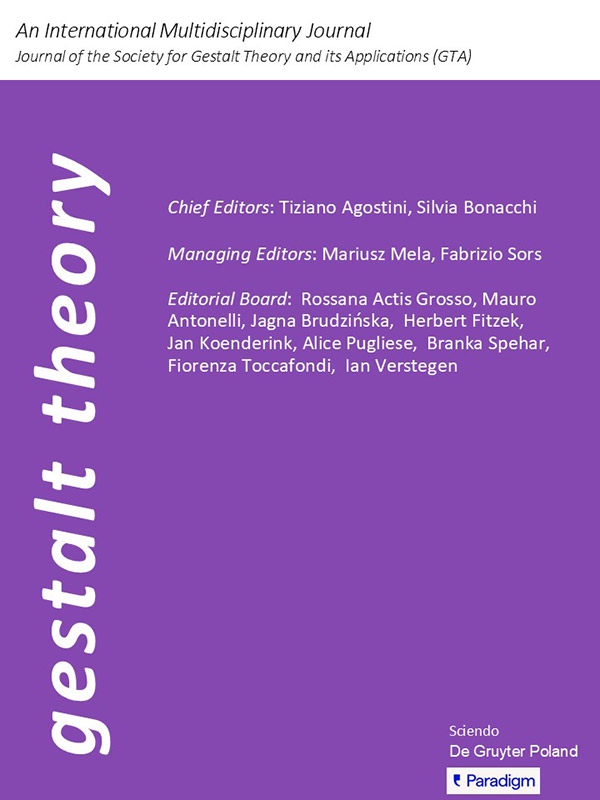Die Gesellschaft für Gestalttheorie und ihre Anwendungen e. V. (GTA) ist eine internationale wissenschaftliche Vereinigung, die sich die Förderung gestalttheoretischen Denkens in Forschung und Anwendung zur Aufgabe gemacht hat.
herzlich willkommen
... auf der Website der Gesellschaft für Gestalttheorie und ihre Anwendungen (GTA)
Die GTA setzt sich dafür ein, gestalttheoretisches Denken sowohl in der wissenschaftlichen Forschung als auch in der praktischen Anwendung zu fördern.
Die Gesellschaft hat Mitglieder aus vielen Ländern, sowohl in Europa als auch weltweit. Zu den Mitgliedern gehören Wissenschaftlerinnen und Praktikerinnen aus Bereichen wie Psychologie, Philosophie, Kognitionswissenschaften, Kunst, Design und Pädagogik.
Das Ziel der Gesellschaft ist die Förderung von Wissenschaft, Forschung und Praxis auf gestalttheoretischer Basis.
Grundlage und Ausgangspunkt des vertretenen Ansatzes ist die Gestalttheorie der Berliner Schule. Die GTA versteht sich als organisatorischer Rahmen zur Förderung, Verbreitung und Weiterentwicklung gestalttheoretischer Erkenntnisse in unterschiedlichen wissenschaftlichen Disziplinen und praktischen Arbeitsbereichen.
Gestalt Theory
Internationale Online Zeitschrift
Sie steht für wissenschaftliche Forschungs- und Anwendungspraxis, aus denen der Mensch nicht ausgeblendet ist.
Was ist Gestalttheorie?
Gestalttheorie ist eine ganzheitliche – ursprünglich psychologische – Denkrichtung. Sie befasst sich nicht nur mit Wahrnehmungsprozessen, Denken und Problemlösen, obgleich diese den Ausgangspunkt der gestalttheoretischen Forschungen bildete. Die dort gefunden Grundtendenzen (z.B. zu Prägnanz, bestmöglicher Ordnung unter den gegebenen Bedingungen, dynamischen Wechselwirkungen) gelten aber in vielen Bereichen menschlichen Erlebens und Handelns, besonders auch in sozialen Zusammenhängen. Gestalttheoretische Erkenntnisse lassen sich auch in anderen Wissenschaften fruchtbar anwenden.
Der häufig gebrauchte Satz „Das Ganze ist mehr als die Summe seiner Teile“ gilt in der Gestalttheorie seit Max Wertheimer nicht mehr als angemessen. Stattdessen spricht man davon, dass „Das Ganze etwas anderes als die Summe seiner Teile ist “: Es geht vor allem darum, dass sich „Teile“ in jeweils anderen „Ganz“-Zusammenhängen verändern und neue Eigenschaften und Funktionen bekommen können, die sie als „Einzelteile“ (isolierte Sachverhalte) nicht haben. Deshalb ist es wichtig, in Wissenschaft und Praxis nicht isolierend nur Details zu untersuchen, sondern Zusammenhänge und dynamische Veränderungen immer mit zu berücksichtigen.
Aktuelles

24. GTA-Tagung
Die nächste GTA-Tagung wird von Mittwoch, den 16. bis Samstag, den 19. September 2026 am musikwissenschaftlichen Institut der Humboldt-Universität in Berlin stattfinden.
Das Tagungsthema lautet: „Gestalt – Imagery – Action“.
Wolfgang-Metzger-Award
Der Preis ist benannt nach Wolfgang Metzger, Schüler von Max Wertheimer und einer der führenden Vertreter der zweiten Generation der Berliner Gestaltschule.
Bewerber für den Metzger-Preis 2024 müssen eine wissenschaftliche Arbeit (in Deutsch oder Englisch) einreichen, die von der Gestalttheorie inspiriert ist. Die Arbeit muss einen Beitrag zur Erforschung oder Anwendung der Gestalttheorie in den Natur-, Geistes-, Sozial- und Wirtschaftswissenschaften sowie in anderen Bereichen leisten.